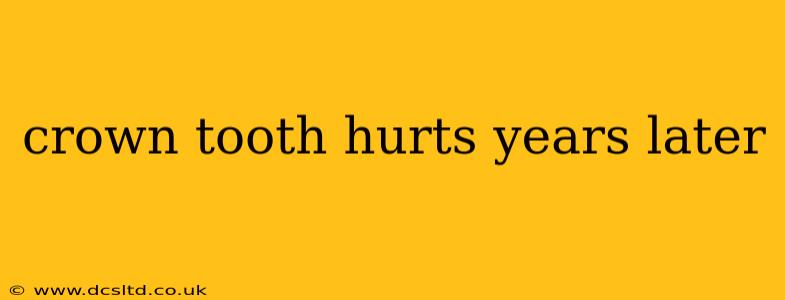Getting a dental crown is a common procedure designed to protect and restore a damaged tooth. However, sometimes, even years after receiving a crown, pain can develop. This can be a concerning issue, but understanding the potential causes is the first step towards finding relief. This comprehensive guide explores why a crowned tooth might hurt years later, examining various possibilities and guiding you toward appropriate solutions.
Why Does My Crowned Tooth Hurt Years Later?
This is a frequently asked question, and the answer isn't always straightforward. Several factors can contribute to pain in a tooth that has been crowned for an extended period. Let's delve into some of the most common reasons:
1. Recurrent Decay:
One of the most prevalent causes of pain in a crowned tooth years after placement is recurrent decay. Even with a crown in place, bacteria can still find their way underneath, leading to decay beneath the crown. This is especially true if there was insufficient cleaning or preparation of the tooth before the crown was fitted. The decay process gradually erodes the tooth structure, eventually causing inflammation and pain.
2. Pulpitis (Inflammation of the Tooth Pulp):
The pulp, the soft tissue inside your tooth containing nerves and blood vessels, can become inflamed, even years after crown placement. This inflammation, known as pulpitis, might be caused by recurrent decay, a poorly fitting crown, or trauma to the tooth. Pulpitis can lead to significant pain, often described as a throbbing or persistent ache.
3. Periodontal Disease:
Gum disease, or periodontitis, can also contribute to pain around a crowned tooth. Bacteria and inflammation around the gum line can spread to the underlying bone and support structures of the tooth, causing pain and even eventual tooth loss. Proper oral hygiene is crucial in preventing periodontal disease.
4. Cracked Tooth:
Even with a crown, the underlying tooth structure might have been weakened or cracked before the crown was placed, or a crack might develop later. This can lead to pain, especially when chewing or biting down. A cracked tooth might require more extensive treatment than simply replacing the crown.
5. Crown Issues:
The crown itself might be the source of the problem. Over time, the crown can become loose, fractured, or develop a poor marginal fit (where the crown meets the tooth). This can lead to leakage of bacteria and irritants, causing sensitivity and pain. A poorly cemented crown can also allow bacteria to invade.
6. Abscess Formation:
An abscess is a pocket of pus that forms due to infection. An infection beneath or around a crowned tooth can create an abscess, resulting in severe pain, swelling, and potentially fever. This is a serious condition requiring immediate professional dental attention.
What Should I Do if My Crowned Tooth Hurts?
If you experience pain in a crowned tooth, regardless of how long ago it was crowned, it's crucial to schedule an appointment with your dentist. Do not attempt home remedies or delay seeking professional care. Your dentist can accurately diagnose the cause of your pain and recommend appropriate treatment, which might include:
- Replacing the crown: If the crown is damaged, loose, or poorly fitted.
- Root canal treatment: If the pulp is inflamed or infected.
- Extraction: In severe cases where the tooth is beyond repair.
- Antibiotics: If an infection is present.
Ignoring the pain could lead to more serious problems, so timely intervention is key.
How Can I Prevent Future Problems?
Maintaining excellent oral hygiene is paramount in preventing future issues with crowned teeth. This includes:
- Brushing and flossing twice daily.
- Regular dental checkups and cleanings.
- Using a fluoride mouthwash.
- Avoiding hard candies and other foods that can damage the crown.
- Being mindful of habits that can put stress on your teeth, such as clenching or grinding.
By following these preventative measures, you can significantly reduce the risk of experiencing pain in your crowned teeth years down the line.
Remember, consistent dental care is the best defense against future complications. Early detection and treatment of any dental problem are essential for maintaining optimal oral health. If you are experiencing pain in a crowned tooth, don't hesitate to contact your dentist.
